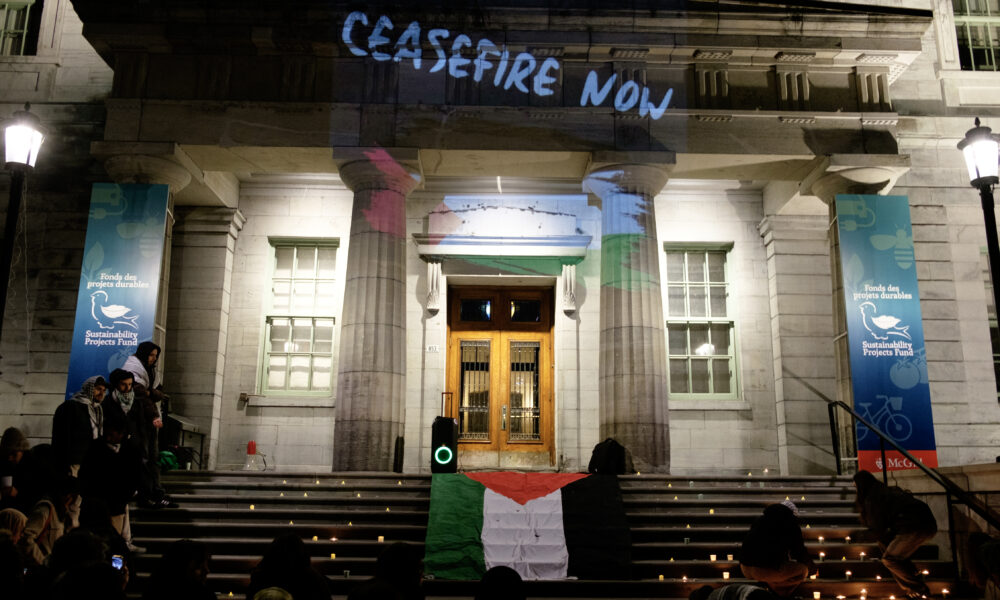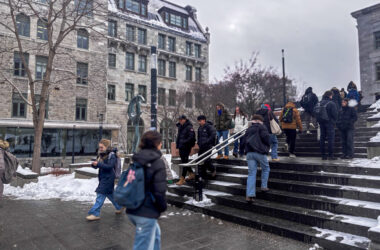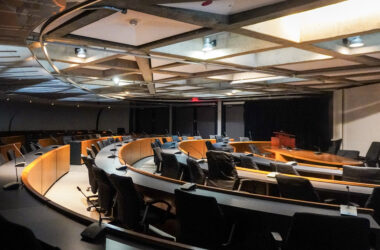Content Warning: Mentions of violence, death, and mourning
The McGill Palestinian and pro-Palestine community members stood in collective grief by the Arts Building on the evening of Nov. 2, as hundreds gathered for a vigil to mourn the Israeli government’s killings of Palestinians in Gaza.
The vigil was organized by Law Students for Palestine at McGill and Solidarity for Palestinian Human Rights (SPHR) McGill. Five other student organizations also endorsed the event. No member of the McGill administration was present for the vigil. McGill did not comment directly on whether the administration attended.
Pocket-sized candles surrounded a Palestinian flag on the steps of the Arts Building. Flags and signs were absent from the crowd at the request of the organizers.
Addresses to the crowd, in English, French, and Arabic, began just past 5:30 p.m., with speeches from the organizers and some of the groups that endorsed the service. The speakers touched on remembering those who the Israeli government has killed in Gaza and criticized Principal Deep Saini’s communication on Nov. 2 for not drawing distinctions between the different groups’ sufferings. They also demanded a ceasefire and encouraged the crowd to take action to support the Palestinians, from protesting to writing to their local Member of Parliament.
Members of the crowd began to light candles and the 6,747 known names and ages of those who have been killed in Gaza were projected onto the Arts building.
According to the Associated Press on Monday, Nov. 6, Israel’s attacks on Gaza since Oct. 7 have killed over 10,000 people, including 4,100 children. Over 1.4 million people in Gaza have also been displaced. Israel’s attack came in response to an attack from Hamas that killed an estimated 1,200 people, with over 200 taken hostage.
An individual at the vigil, who asked to not be named, expressed a deep sense of sorrow, finding themselves at a loss for words amid the grief.
Another attendee, who also wished to remain unnamed, said that they have had trouble sleeping and engaging with university work in the past three weeks, with all their thoughts being about Gaza.
“This is my reality, [this is] what I think about through the day, I literally can’t cope,” they said.
Near the end of the vigil, a minute of silence was held in remembrance of those who have been killed in Gaza. Only the sound of distant cars from Rue Sherbrooke could be heard as the names continued to be projected onto the Arts building. Some closed their eyes and tilted their heads forward, and dozens quietly cried.
The service drew to a close after about an hour. Music played quietly as attendees lined the stairs with more candles and laid flowers at the front of the steps.
The organizers invited the crowd to write notes of remembrance on pieces of paper to hang across the stairs, with many choosing to sit cross-legged and write on the floor in front of the stairs. The music then went silent. Those writing and lighting candles continued while community members stood at the front and soberly watched on.
“I thought the event was done very well. I came by myself but I am glad I did. We haven’t done this [at McGill] yet to my knowledge and hearing from the speakers was moving,” an attendee, who did not want to be named, said reflecting on the vigil. “The situation right now is so terrible […] we needed to come together.”
Resources:
For faculty and staff:
- The Employee & Family Assistance Program is available to McGill employees as a confidential support service.
For students:
- The Student Wellness Hub offers counselling services for students located in Montreal.
- Keep.MeSafe is a service accessible 24/7 whenever you need to speak (or text) with a mental health professional for support. You can access Keep.MeSafe from anywhere in the world.
This piece was updated at 11 p.m. on Nov. 13 to revise the estimated Israeli death toll. On Nov. 10, Israel lowered its estimated death toll following the Oct. 7 attack from 1,400 people to 1,200.








